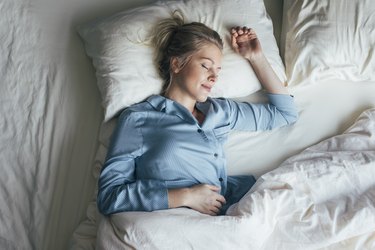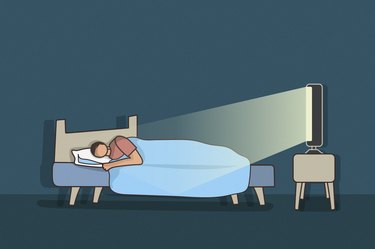
When your eyes consistently open just a few minutes before your alarm goes off, you likely have one of two thoughts. Either: "I lost that last stretch of sleep again!" or "Am I some kind of sleep psychic?"
Though sometimes annoying, opening your eyes just ahead of the dinging clock is a perfectly normal thing to do, especially if you tend to be consistent about when you go to bed at night and wake up in the morning, says Sudha Tallavajhula, MD, associate professor of neurology with UTHealth Houston and medical director of the TIRR Memorial Hermann Neurological Sleep Medicine Center. (In other words, you don't sleep in for hours on the weekend.)
Video of the Day
Video of the Day
In fact, it's a sign you're doing sleep right. "The hope is we have trained our body to fall asleep and wake up at a certain time, even without needing the alarm," she explains. "The circadian rhythm is very trainable."
The Role of Your Circadian Rhythm
By circadian rhythm, Dr. Tallavajhula means your body's natural internal clock that regulates your sleep-wake cycle. It responds primarily to changes in light, which dictates the production of the sleep-promoting hormone melatonin, per the National Library of Medicine. As it gets dark in the evening, your brain signals the body to produce melatonin so you start to get sleepy. When you see light in the morning, melatonin production turns off and you feel more alert.
Having a set bedtime and a set wake time (aka, the time when your alarm goes off) can make this rhythm even more precise, to the point where your body knows pretty much exactly when to start the day, Dr. Tallavajhula points out.
"Essentially, you've trained your body to do this. It's nothing to worry about, and in fact, there's not much you can do about it," she says. (Plus, isn't it nicer to rouse naturally, rather than having a loud noise jolt you awake?)
When to Be Concerned About Waking Up Early
If you're getting the recommended seven to eight hours of sleep per night and feel rested when you wake up — even if you wake up before your alarm — there's no need to worry, says Dr. Tallavajhula. Your body has gotten on a schedule that works for it.
Keep in mind, too, that it's normal to wake up briefly in the wee hours of the morning. "The first two to three hours of sleep tend to be the deepest, Dr. Tallavajhula says. "After that, arousals are common. But you should be able to fall back asleep quickly."
On the other hand, you should let your doctor know if you're consistently waking up much earlier than you'd like and you don't feel rested, or if you're still tired after getting seven to eight hours of sleep, Dr. Tallavajhula recommends. Both scenarios could be signs of a sleep disorder such as sleep apnea, or another problem like overactive bladder, anxiety or depression.
Was this article helpful?
150 Characters Max
0/150
Thank you for sharing!
Thank you for your feedback!
Is this an emergency? If you are experiencing serious medical symptoms, please see the National Library of Medicine’s list of signs you need emergency medical attention or call 911.


